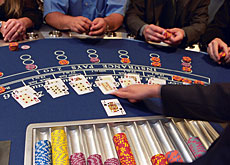
Casinos aim to take the pain out of gambling

High stakes and high society – casinos may have a glamorous image but they can lead to ruin for those who end up addicted to gambling.
Five years after the first Swiss casinos opened for business, almost 17,000 people have been banned from playing in the country’s 19 gambling houses, mostly for addiction reasons.
Casinos have a legal obligation to work to prevent gambling addiction. swissinfo visited a casino on a midweek afternoon to see the everyday players the law aims protect.
Inside the Casino Barrière de Fribourg is another world. It is cool and dark with no hint of the scorching summer’s day outside. In the moment it takes to get your bearings it seems like a vast space filled with flashing, beeping, jingling machines.
The regulars trickle in, flash their identity cards and head straight for their favourite machines. At this time of day the table games are lying idle.
But the most popular and most addictive slot machine game, Super Cherry, is a hive of activity. There are players in front of two thirds of the casino’s 20-odd Super Cherry machines, including one player who is able to master two machines simultaneously.
Low income
Psychiatrist Claude Uehlinger, head of the Fribourg Addiction Treatment Unit, provides treatment to gambling addicts, most of whom come to him under pressure from their family circle.
“Socio-economic status is a factor in gambling addiction, with less-educated people on lower incomes more at risk,” Uehlinger told swissinfo.
“It’s not only a question of time but also a question of environment. Ease of access to slot machines, for example, can trigger and speed up the addiction but psychological predisposition is also important,” Uehlinger said.
The personality trait of impulsivity plays a major role in the development of pathological gambling.
“A person with a weakness in terms of mood stabilisation would be more at risk,” Uehlinger said.
Intervention
According to Linda McCarthy, resident psychologist and customer relations manager at Fribourg Casino, it is the casino’s goal for the client to remain healthy.
“Our approach is more about collaboration than confrontation. If necessary we will direct them to the appropriate professional help.”
Casinos are obliged to train staff to recognise problem clients. In Fribourg, once a person has been identified as a potential addict, McCarthy approaches them, suggesting a deal to limit the number of visits per month or stop access altogether. This arrangement would include all Swiss casinos.
It is not uncommon for family members of players to call the casino asking for their relative to be barred. If they can supply proof of financial difficulties, the casino will impose a ban on the person.
“There are still people who slip through the net, we cannot prevent all cases but we can do a lot to reduce the risk,” McCarthy said.
Inspections
The Swiss Federal Gaming Board supervises and inspects Swiss casinos and ensures that the law is upheld. In its report for 2006, the Board praised casinos for significantly improving their measures for gambling prevention.
The Board carries out unannounced and arranged inspections which can be short one-day inspections or in-depth three-day visits.
“Casinos must observe their clients, keep a record of problems and speak to visitors if necessary. They may also demand proof of the person’s financial status and they have the right to bar the player,” Jean-Marie Jordan of the Federal Gaming Board told swissinfo.
“From the social point of view, we acknowledge the casinos are on the right track,” Jordan added.
According to Uehlinger it takes months of treatment exposure to deal adequately with gambling addiction. “Gambling is a very severe addiction and it requires long and repetitive treatment including psychotherapy, behavioural therapy, medication and lifestyle change.”
“Addiction cannot be completely cured but you can people move from an addiction state to a remission state. However addicts have a predisposition to go back to their addiction throughout their lives.”
Switzerland has one of the highest casino densities in the world.
There are 19 casinos in Switzerland, 9 A-casinos and 12 B-casinos.
B casinos are restricted to 150 gaming machines, three table games and maximum bets of 25 francs.
A-casinos decide themselves how much the bets can be.
In 2006 Swiss casinos made a profit of SFr955 million.
SFr750 was lost in slot machines and the remaining 205 came from table games, such as Black Jack or Roulette.
A report co-commissioned by the Federal Gaming Board in 2004 found that the average monthly loss incurred by gambling addicts was SFr5,380 ($4,437).
Of the gamblers in counselling, 54% were losing half or more than half of their monthly income on average.
The gambling career can be subdivided into three phases:
1. The positive early phase, also known as the winning phase 2.The critical adjustment or losing phase 3. Finally the addiction or desperation phase.

In compliance with the JTI standards
More: SWI swissinfo.ch certified by the Journalism Trust Initiative




























You can find an overview of ongoing debates with our journalists here . Please join us!
If you want to start a conversation about a topic raised in this article or want to report factual errors, email us at english@swissinfo.ch.